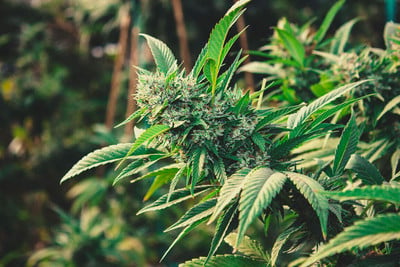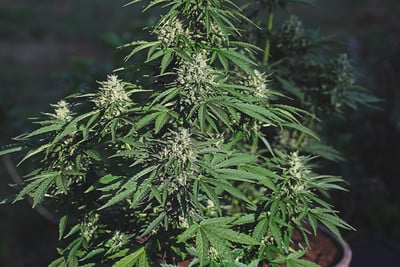.

Is marijuana a gateway drug?
Even though it's considered one of the least harmful drugs, many still malign marijuana as a "gateway drug", meaning it theoretically leads to harder drug use over time. There are arguments for and against, but the issue is far more nuanced than you'd think. Read on to learn more.
Contents:
Ever since marijuana has become a socially relevant topic, there's been outcry against it. Some claimed you could overdose on it, others would say it made you an instant burnout. Amongst all of these, though, the "gateway drug" argument has been the loudest and most consistent point of discussion among marijuana detractors. No matter how much research was performed at the time, this was taken as a fact amongst a conservative generation. The truth, however, is far more nuanced than either side of the issue realises. With legislative, social, and biological factors coming into play, both camps have a lot to consider.
WHAT IS THE GATEWAY DRUG THEORY?
If you're not up to date on marijuana discourse, you might not be familiar with the term "gateway drug". To keep it simple, it's the idea that using one psychoactive substance (like marijuana) will make you want to chase more highs. In theory, you'd end up using different drugs that are more dangerous and addictive than marijuana. This doesn't just apply to drugs, either. Since e-cigarettes have become popular, discussion on whether they're a gateway to conventional cigarettes, and eventually drugs, has heated up.
THE ARGUMENT FOR MARIJUANA AS A GATEWAY DRUG
Focusing back on marijuana, there are a good amount of arguments for it being a gateway drug. One of the main points involves the brain's reward system and the way marijuana affects it. To elaborate, when someone starts using marijuana before their early 20s, it can rewire their brains to prefer the sharp dopamine spikes. From there, other drugs can seem more appealing, and the likelihood of trying them theoretically spikes.
Along with that, someone who buys and uses marijuana is more likely to know people using other drugs. In turn, gateway theory supporters argue that these individuals are more likely to try other, harder drugs. Backing things up statistically, people say the gateway drug status of marijuana is secured by the fact that 44.7%[1] of people who try it end up doing other illicit drugs. That, we'll admit, is a significant amount of people, and the numbers shouldn't be ignored.
THE ARGUMENT AGAINST MARIJUANA AS A GATEWAY DRUG
Those who take a good look at that number, though, will notice something important. While it is a significant number, it is not a majority. For those keeping score, that means 55.3% of marijuana users never went on to try another illicit substance. That, we would argue, is also an important figure. In fact, rather than leading people to new substances, there's evidence that marijuana could do the opposite. In a study on 481 Vancouver youth, Canadian researchers found that cannabis use was actually protective[2] against the introduction of injected drugs in their lives.
Going along with that, many argue that marijuana’s illicit status is what makes it a gateway drug in the first place. Since many have to buy from dealers and smoke in certain places, they end up being exposed to other drugs. Basically, if you know a weed dealer that sells cocaine, you're more likely to do cocaine than someone who doesn't smoke, and subsequently doesn't know the dealer. If you could buy weed at a dispensary, though, you'd never get access to coke. From there, theoretically, you and the person who doesn't smoke have equally little temptation.

CONTEXTUAL FACTORS MAKE A SIGNIFICANT DIFFERENCE
As with many drug abuse-related questions, case-by-case context is vital to the discussion. Note, for instance, that someone with an addictive personality who smokes marijuana is likely to try other drugs afterward. This, however, is because of their inclination towards dependency, rather than something marijuana specifically did to rewire them.
Social factors are important to consider as well. Naturally, someone who grows up surrounded by many illicit drugs will be more likely to try them, and marijuana will likely be first. To be clear, though, this doesn't mean marijuana is directly rewiring them to want hard drugs. Rather, this just reflects the general temptation to try these substances, alongside the fact that marijuana is the most accessible.
Also consider: the amount of marijuana one smokes better indicates future addiction than the fact that they smoke at all. If they only take a few hits on the weekends, there's a good chance they aren't interested in opiates. If they spend most of their day smoking, though, they might end up craving a stronger sedative. That, however, is not likely given that only 4.5%[3] of marijuana users go on to abuse opiates.
DOES SMOKING WEED LEAD TO HARDER DRUG USE? THE DEBATE CONTINUES
We wish there were solid answers, but unfortunately, those are hard to come by. Even with research flying around in both directions, there's no objective[4] ruling that marijuana is or isn't a gateway drug. As with any study on illicit drugs, the data is limited, and confounding variables are a scourge. Furthermore, many of the studies on the matter were performed on animals. Naturally, there are many questions surrounding how applicable these findings are to humans.
All that being said, the only cure to curiosity here is more and better research. Once labs are able to get legal clearance to study these substances in greater depth, we'll learn at lightning speed. When clearance comes, though, researchers have to account for variables such as addiction predisposition and socioeconomic status. They should also avoid data from voluntary response questionnaires, since people are unlikely to be honest about their true rate of use.
- Probability and predictors of the cannabis gateway effect: A national study https://www.ncbi.nlm.nih.gov
- Is cannabis a “gateway drug”? https://www.publichealthontario.ca
- Is Marijuana a Gateway Drug? https://www.psychologytoday.com
- Is Cannabis a Gateway Drug? Key Findings and Literature Review https://www.ncjrs.gov







































